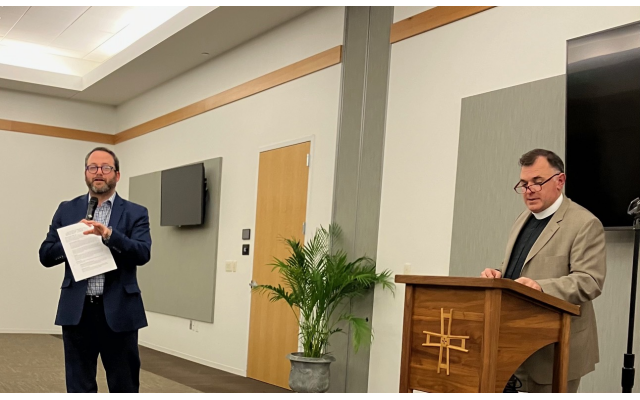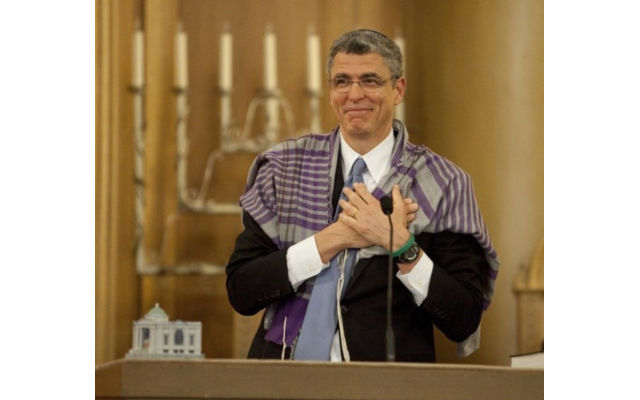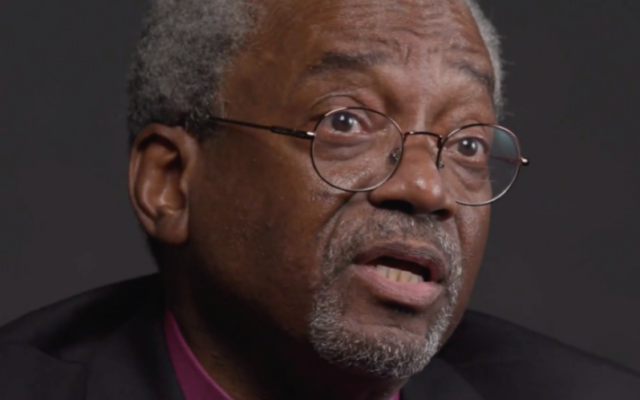Interfaith Panel Talk Religion and Warfare
The discussion brought together participants from multiple congregations to discuss how each religion looks at warfare.

Approximately 50 members of Temple Sinai joined an equal number of congregants of Holy Innocents Episcopal Church last month at the Protestant church in Sandy Springs to discuss how each of their faith’s traditions views war. The two congregations are within a half mile of one another and over the years have had numerous interfaith programs.
To help facilitate the discussion, Rabbi Brad Levenberg, who is a senior rabbi at his congregation, prepared a five-page handout on Jewish perspectives on war that quoted often from Jewish scripture on the types of war permitted by Jewish tradition, the rules of warfare, and the admonition that peace is always preferable to war.
Warfare, within the Jewish tradition is permitted in self-defense, or as is the case of war that is described in the Hebrew Bible, war that is waged at the behest of G-d. The war against the Amalekites, that was fought in the early history of the Exodus and the wars against the seven Canaanite nations, after the Israelites crossed over the Jordan River, are examples of wars fought with G-d’s support. These wars, known in Hebrew as Milhemet Mitzvah, are in contrast to wars that are optional, known as Milchemet Reshut.

Levenberg cited the contemporary Jewish theologian Rabbi Elliott Dorff, noting the Talmud teaches that self-defense is always a justification for violence against another. Dorff inferred from a teaching in the tractate of Yoma of the Babylonian Talmud that if “someone comes to kill you, rise up to kill him first.” According to Jewish law, a nation has an obligation to defend itself against actual attacks and against anticipated attacks.
The Temple Sinai rabbi was part of a group of two dozen Atlanta rabbis and Jewish community leaders who visited Israel in February to learn firsthand about the Oct. 7 attack by Hamas, to talk with survivors of the violence that day, and to visit one of the sites where the murder of Israeli civilians took place. The justification for retaliation in Gaza by the Israeli army, for example, is grounded, according to Levenberg, in Jewish tradition.
“Judaism has never been a tradition, religious or national or communal or any way about Judaism that has said we are explicitly pacifists,” Levenberg said. “While Judaism most certainly affirms that the goal is peace, Judaism also recognizes that there are degrees of peace, and sometimes, sometimes war has to happen.”
The Holy Innocents pastor, the Rev. Bill Murray, described how Christianity was transformed in the fourth century of the Common Era, when the Church allied itself with the Roman Empire. What had started out as a religion with a strong pacifist tradition became one that suppressed dissent and heresy with violence. The Rev. Murray pointed out that it was the North African Christian leader, Augustine of Hippo, that formulated the concept of a just war.

According to the Episcopal church leader, Augustine wrote that “good men undertake wars, when they find themselves in such a position as regards the conduct of human affairs, that right conduct requires them to act, or to make others to act, in this way.”
War, according to the teachings of Augustine, who is one of the important saints of the Church, can be a moral obligation.
“Augustine actually came up with the term that describes that moral obligation,” Murray said. “It’s first used in this book, ‘City of God,’ and its’s called a ‘just war,’ or ‘justified war.’ And so, suddenly Christianity was thrust into a position where, with armies on its side, it had to make decisions about whether it was an appropriate time to use force and when it was not an appropriate time to use force.”
On Jan. 30, the Union for Reform Judaism, of which Temple Sinai is a member, issued a statement that described the Israel-Hamas war as “just” but at the same time the movement, which is the largest single Jewish religious organization in America renewed its support for a two-state solution to the conflict. It opposed a suggestion by Prime Minister Benjamin Netanyahu that Jews might resettle the Gaza Strip, as has been done on the West Bank.
“Ongoing West Bank occupation without a willingness to seek an end through a peaceful resolution of the conflict will condemn future generations to endless strife,” the statement read. “Reestablishing settlements in Gaza will have a similarly detrimental impact. Denying the Palestinians’ right to self-determination is an impediment to peace.”
At the end of March, 140 Christian leaders — including the presiding bishop of the Episcopal Church in America — went even further. They called for a permanent ceasefire and an end to all military aid to Israel.



comments